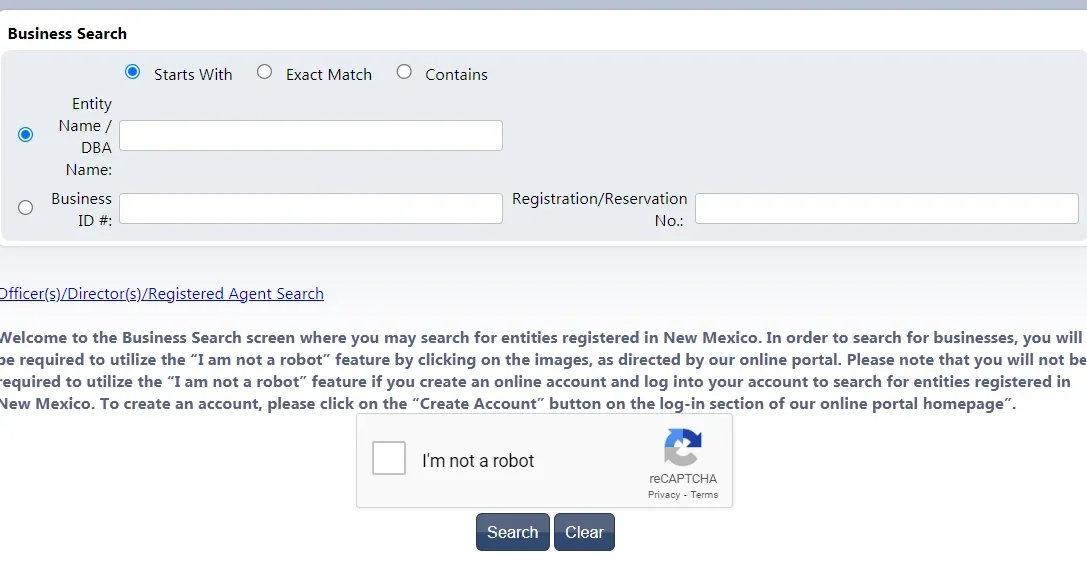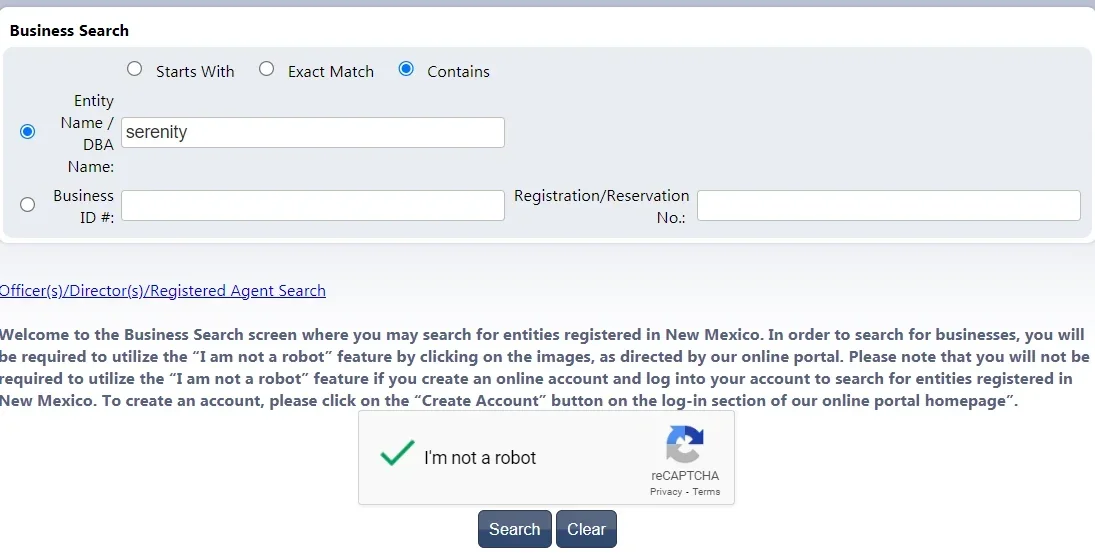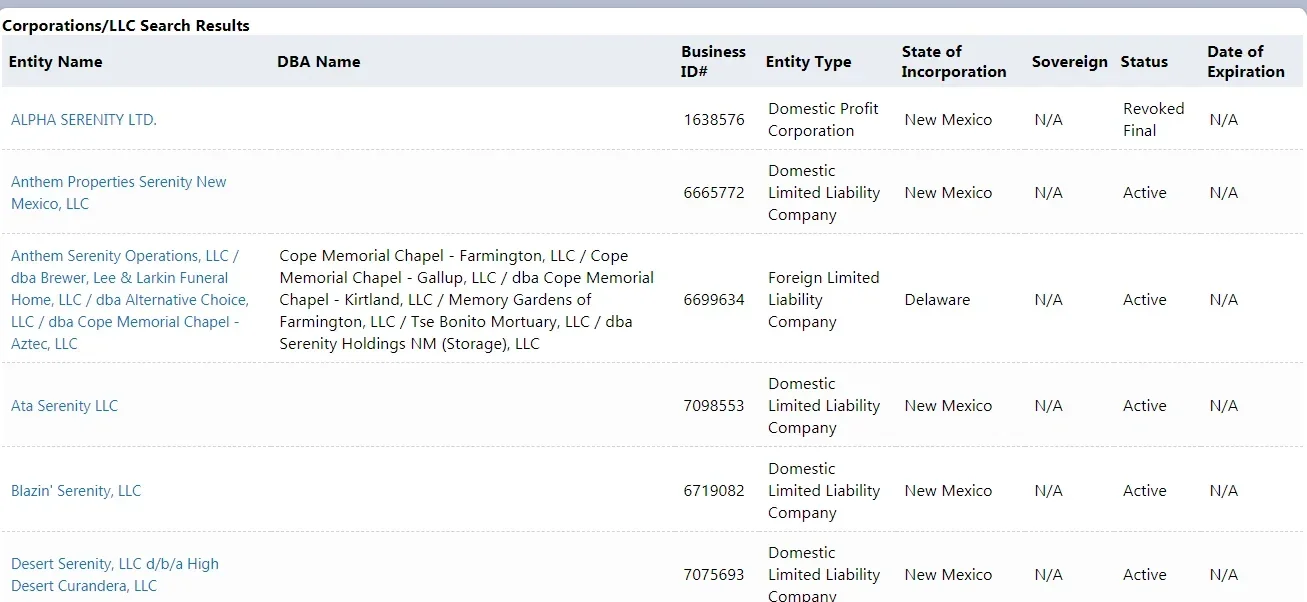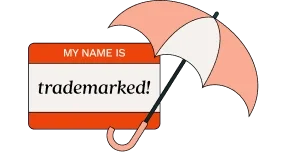You can conduct a New Mexico business entity search on the NM Secretary of State website. But before you start your NM business search, learn about what to include (and not include) in your name and why it might be especially important to trademark your name in New Mexico.

New Mexico Secretary of State business search contact information
The New Mexico Secretary of State handles all business-related services, so you’ll want to have their contact information:
- State website: https://www.sos.state.nm.us/
- Email: business.services@state.nm.us
- Business phone: (505) 827-3600
- Address: 325 Don Gaspar, Suite 300, Santa Fe, NM 87501
Why conduct a New Mexico business search?
A New Mexico entity search is an essential part of forming your business because it confirms that your name is unique.
You need a unique name for several reasons:
- You won’t be able to register a name that’s too similar to another business name. Trying to do so can slow down the formation process.
- The state uses your name to identify your business. It’s important for tax purposes that your name isn’t mixed up with another business.
- If your business name is too similar to another, they could sue you for infringing on their business. An NM entity search helps you avoid costly lawsuits.
Step-by-step guide to a NM SOS business search
The Secretary of State (SOS) keeps a searchable database of business records. Your NM LLC search or other business entity search should start there.
Step One
Go to the NM SOS business search website. You’ll see options to search by Entity Name/DBA Name, Business ID, or Registration/Reservation number.

Step Two
Keep the default option to search by Entity Name selected. Change the option above the search bar to “Contains” to keep your search broad and find businesses that contain the same words you’d like to use in your business name. Then type in different words you’d like to use in the search bar. Check “I’m not a robot” and hit “Search” to start your NM business lookup.

Step Three
You’ll see a list of New Mexico business names containing the keyword you entered. You’ll also see any DBA (“doing business as”) names, the business entity type, registered agent information, and status. If your business entity search reveals a similar name with an “Active” status, that name is taken.

Important naming guidelines for New Mexico businesses
Beyond being unique, make sure your desired name follows state regulations before you conduct your New Mexico business lookup.
- Your business name can’t include words that make it sound like it’s a government agency or affiliated with the government.
- Your name can’t suggest that your business does something illegal.
- Your business name can’t contain words that imply official licensing without being able to produce the license or registration. For instance, you can’t use bank or banking unless you’re a registered bank, or references to CPAs unless everyone at your firm is a licensed CPA.
Your name must also include certain designations depending on the type of business:
- Limited liability company: LLCs must contain “limited liability company,” “limited company,” “LLC,” or “LC” (with periods or without). You can leave these out during your New Mexico LLC search.
- Corporation: Must contain “corporation,” “company,” “incorporated,” “limited” or an abbreviation of one of these terms. However, don’t include these in your New Mexico corporate search.
Other business name considerations
A New Mexico SOS business search is important, but there are a few other searches you should also perform.
- Domain name availability. Your domain name is your website address, so you’ll want it to be similar to your business name. Check sites like GoDaddy or Wix to make sure the domain name you want is also available—and purchase it before someone else does.
- Trademarks and service marks. The New Mexico Secretary of State tracks trademarks in a different database. Do a trademark business entity search on the state website, as well as on the U.S. Patent and Trademark Office’s website.

Next steps to start your New Mexico business
Once you’ve completed your MA Secretary of State business search, you’ll need to complete a few other steps:
- Form your business. Submit your formation paperwork to the NM SOS. You can do this online for LLCs, but you have to submit documents for corporations and partnerships through mail or in person.
- Register a reserved name. Unlike other states, New Mexico doesn’t have a process to register a DBA if you want to conduct business under a different name than your legal business name. However, you can register a reserved name. The name reservation expires after 120 days, but can allow you to do things like open a bank account under that name.
- Trademark your name. For greater legal protection and the ability to operate under a different name for longer than 120 days, consider trademarking your business name.
- Get a business license and EIN. Depending on your business, you might need a license from your city or county. You might also need an Employer Identification Number (EIN) from the IRS.
New Mexico business searches made easy
Conducting a New Mexico business search is an essential step toward making your dream a reality—and LegalZoom can help. Use our business entity search service to quickly and easily find out if the name you want is taken. Then turn to us for LLC formation, trademark registration, and more. Start your NM corporate search on LegalZoom today and start moving forward.
FAQs
How do I find out if a business name is taken in New Mexico?
To check if a business name is available, do a NM Secretary of State business search in the online database. Ensure the name is unique and meets state requirements.
How much does it cost to register an LLC in New Mexico?
Registering an LLC in New Mexico costs $50, which covers the filing of the Articles of Organization. Additional fees may apply for optional services or expedited processing. Before you file, conduct a New Mexico LLC lookup to streamline the process.
Do you need a registered agent for an LLC in New Mexico?
Yes, a registered agent is required for an LLC in New Mexico. The agent must have a physical address in the state and be available during business hours. You’ll need to provide registered agent information when you form your LLC. Their information will appear during a NM LLC lookup.

